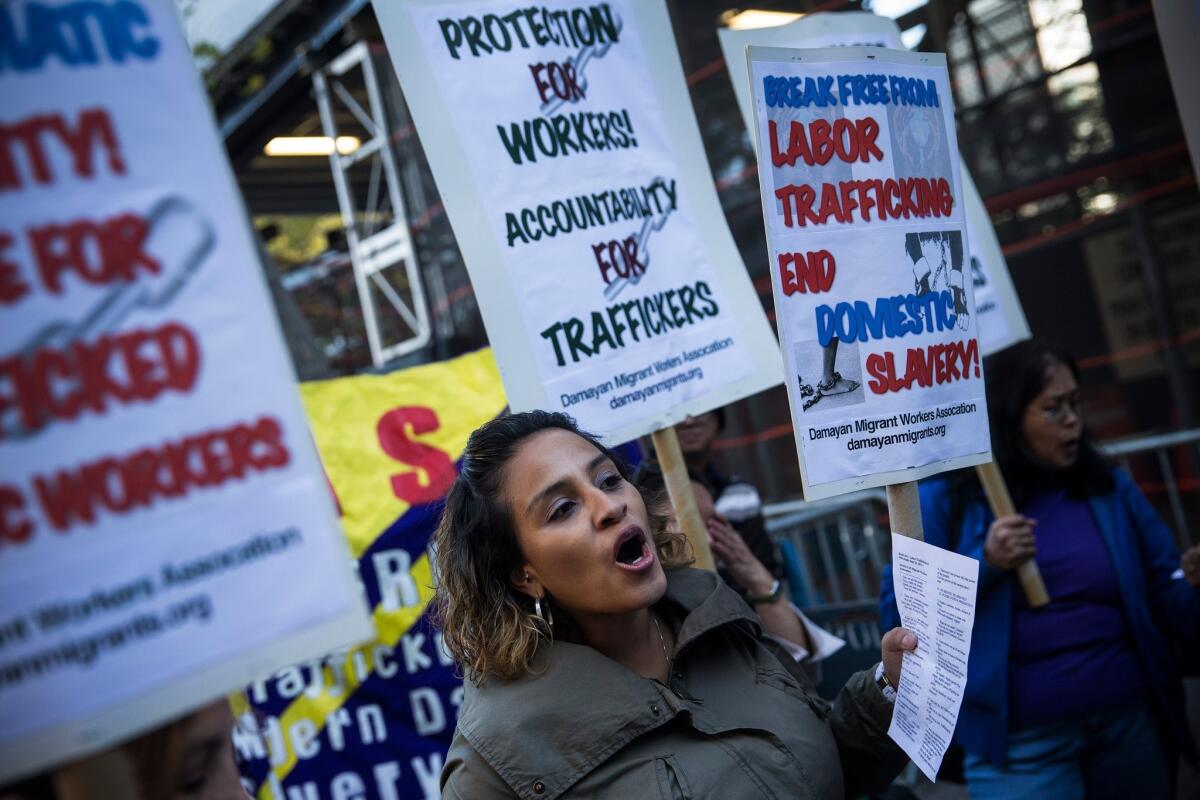Slavery still haunts Africa, where millions remain captive

JOHANNESBURG, South Africa -- African countries dominate a new global index on slavery, with 38 of the 50 nations where the scourge is at its worst found on the continent. The Global Slavery Index, released Thursday, estimated that nearly 30 million people remain enslaved globally, millions of whom are in Africa.
Mauritania has the poorest record, with some 150,000 people in a population of 3.8 million held captive, many of whom inherited their status from their parents.
Other African countries with particularly high prevalence of slavery are located in West Africa: Benin, Ivory Coast, Gambia, Gabon and Senegal.
West Africa has a somber place in the history of transatlantic slavery as the departure gateway for slaves seized in raiding expeditions before they were shipped to the New World. Today children are trafficked around the region and forced into domestic service, farm labor or sexual exploitation.
[Updated at 2:45 p.m., Oct. 17: India has the highest number of slaves, according to the index, with nearly 14 million, but it ranked fourth in terms of prevalence.]
The index was created by Walk Free Foundation, an anti-slavery organization.
“In 2013, modern slavery takes many forms, and is known by many names,” the report said. “Whether it is called human trafficking, forced labor, slavery or slavery-like practices (a category that includes debt bondage, forced or servile marriage, sale or exploitation of children including in armed conflict), victims of modern slavery have their freedom denied, and are used and controlled and exploited by another person for profit, sex or the thrill of domination.”
In many African countries, children are sold into labor by poor rural parents, sent to Koranic schools where they are forced to beg on the streets by imams, or recruited as unpaid porters or child soldiers by armed militias. Girls are often married off young and denied an education, or forced to be sex slaves, porters and cooks by armed groups.
More than 16% of slaves are in sub-Saharan Africa, according to the report.
“Ongoing conflicts, extremes of poverty, high levels of corruption and the impact of resource exploitation to feed global markets all increase the risk of enslavement in many African countries. Child and forced marriages are still tolerated in the context of informal or ‘traditional’ legal systems in many countries,” the report said.
In Mauritania, as many as 20% of the population is enslaved, according to a nongovernmental organization there interviewed by the Walk Free Foundation. A 2013 U.S. report on human trafficking gave a similar estimate.
Slavery in Mauritania goes back generations and is deeply entrenched, though the country has banned the practice and signed international conventions against slavery and child labor.
Adults and children from slave castes in Mauritania are usually illiterate, unaware of their rights and enslaved in domestic labor and as cattle herders, regarded as the property of their masters. Slaves can see their children sold to other masters, or given away as gifts.
“Indoctrination to ensure people in slavery accept their situation of ownership is a key feature of slavery in Mauritania, with understandings of race and class, as well as some religious teachings being used to justify slavery,” the Global Slavery Index report said. “Without access to education or alternative means of subsistence, many believe that it is God’s wish for them to be slaves.”
The report called on Mauritania to conduct a nationwide investigation into continuing forms of slavery, end impunity for slaveholders and do more to support slaves leaving their masters and to help them mount legal action for compensation.
In Ivory Coast, many children work without pay in fishing, farming, building, domestic service and the cocoa industry, one of country’s major exports. Up to 800,000 children work on small family farms with working conditions “akin to the worst forms of child labor,” according to the report.
The United States is ranked 134th in terms of prevalence of slavery, with nearly 60,000 estimated to be in modern slavery.
The Walk Free Foundation was founded last year by an Australian mining magnate, Andrew Forrest, to campaign against slavery and fund programs to eradicate the practice. One of its campaigns focuses on pressing companies to ensure their production and supply chains are free of developing-world slaves.
Former Secretary of State Hillary Rodham Clinton said the report was not a perfect measure of global slavery but was a good starting point.
“I urge leaders around the world to view this index as a call to action, and to stay focused on the work of responding to this crime,” she said.
ALSO:
Iran’s nuclear resolve fueled by Iraq’s chemical assault in war
China’s response to typhoon angers residents in hard-hit Yuyao
Seven Balkan wannabes still need reforms to join EU, report says
Twitter: @latimesdixon
More to Read
Sign up for Essential California
The most important California stories and recommendations in your inbox every morning.
You may occasionally receive promotional content from the Los Angeles Times.









